Maslow’s hierarchy of human needs is a psychological model promulgated by the American psychologist Abraham Maslow in his 1943 paper “A Theory of Human Motivation.”
Maslow premise is that individuals have a hierarchy of needs which need to be met to maintain sound physical and mental health.
Maslow’s hierarchy of human needs is typically rearranged into a pyramid of importance with the most fundamental needs at the base and higher-level needs at the top. There are typically eight layers in the pyramid, but the simplified version of Maslow’s hierarchy of human needs features five layers.
Maslow proposed that individuals must satisfy lower-level needs before progressing to higher-level needs. Each stage of the pyramid only becomes possible after lower-level needs are sufficiently met.
However, some would argue that is not strictly true.
In his book ‘Man’s Search For Meaning,’ in which Viktor Frankl describes his experience in Nazi concentration camps during the Second World War, it is demonstrated that loving and belongingness can still be achieved even if an individual’s physiological and safety needs are not satisfied.
On the other hand, the capacity to feel love and belonging was probably already part of the biological structure of some of the captives. Regarding psychological growth, the five steps of Maslow’s hierarchy of human needs provide a path for self-development — from surviving to thriving.
Additionally, Maslow suggested that self-actualised individuals tend to have a more accurate perception of reality, greater acceptance of themselves and others, a strong sense of purpose, and can achieve states of peak experiences characterised by flow, creativity, and personal fulfilment.
Essentially, Maslow believes that self-actualisation is a state of wholeness. Let’s not forget that the English words whole and healthy share the same etymological root. Thus, developing your personality to fullness should be the goal in life.
Thought-Provoking Quote
“Since this inner nature is good or neutral rather than bad, it is best to bring it out and to encourage it rather than to suppress it. If it is permitted to guide our life, we grow healthy, fruitful, and happy.
~ Abraham Maslow: Toward A Psychology Of Being, p.14, Kindle Loc 219 (1962)
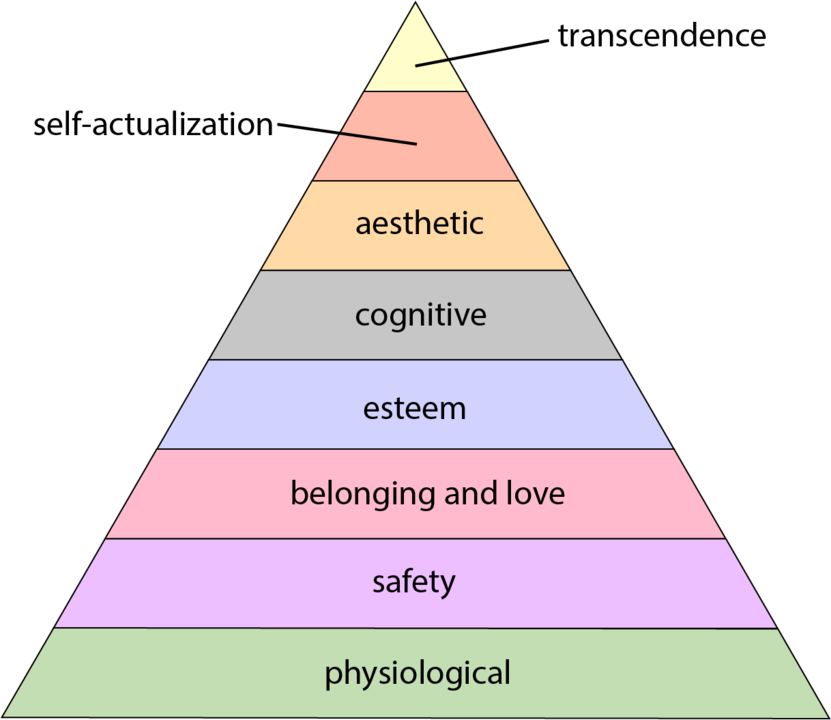
The fundamental condition that Maslow’s hierarchy of human needs starts with our most basic needs required for survival; food, water, air, shelter, and sleep.
If our basic physiological needs are not met, it can lead to physical discomfort (dis-ease) and other physical and psychological health issues. The latter includes a heightened sense of anxiety, desperation, and a singular focus on survival which keeps you rooted in limited growth potential.
Once physiological needs are met, individuals seek safety and security, including physical safety, financial security, health, and protection from harm. When safety needs are not met, individuals may experience feelings of insecurity, fear, and anxiety.
This can manifest as hypervigilance, distrust, and avoidance of situations perceived as risky or threatening. Insecurity plays a role in denying yourself opportunities to fulfil your wishes and desires.
After achieving safety, people desire social connections, love, affection, friendship, and a sense of belonging within family, friendships, and communities.
A lack of love or sense of belonging can lead to feelings of loneliness, isolation, and alienation. Individuals may experience emotional distress, depression, and a sense of not fitting in or being accepted by others which impedes the building of self-esteem.
With social belonging satisfied, individuals strive for self-esteem, respect from others, recognition, status, and accomplishment. This includes both external esteem, such as reputation and recognition [Everyman], and internal esteem, such as self-confidence and self-respect [Caretaker].
Failure to meet esteem needs can result in low self-esteem, feelings of inadequacy, and a lack of confidence. Individuals may seek validation and approval from others, feel unfulfilled or unsatisfied with their achievements, and struggle with feelings of inferiority.
At the pinnacle of the hierarchy is self-actualisation, where individuals pursue personal growth, self-improvement, fulfilment of potential, creativity, and achieving one’s purpose. This involves realising one’s capabilities and striving to become the best version of oneself.
If self-actualisation needs are not met, individuals may experience a sense of stagnation, unfulfilled potential, and a lack of purpose or meaning in life. This can lead to feelings of frustration, existential angst, and a longing for personal growth and self-expression.
Thought-Provoking Quote
“Self-actualisation stresses full humanness, the development of the biologically based nature of man.”
~ Abraham Maslow, Toward A Psychology Of Being
To become whole, you need to understand human nature. This can be achieved by knowing your archetypes.
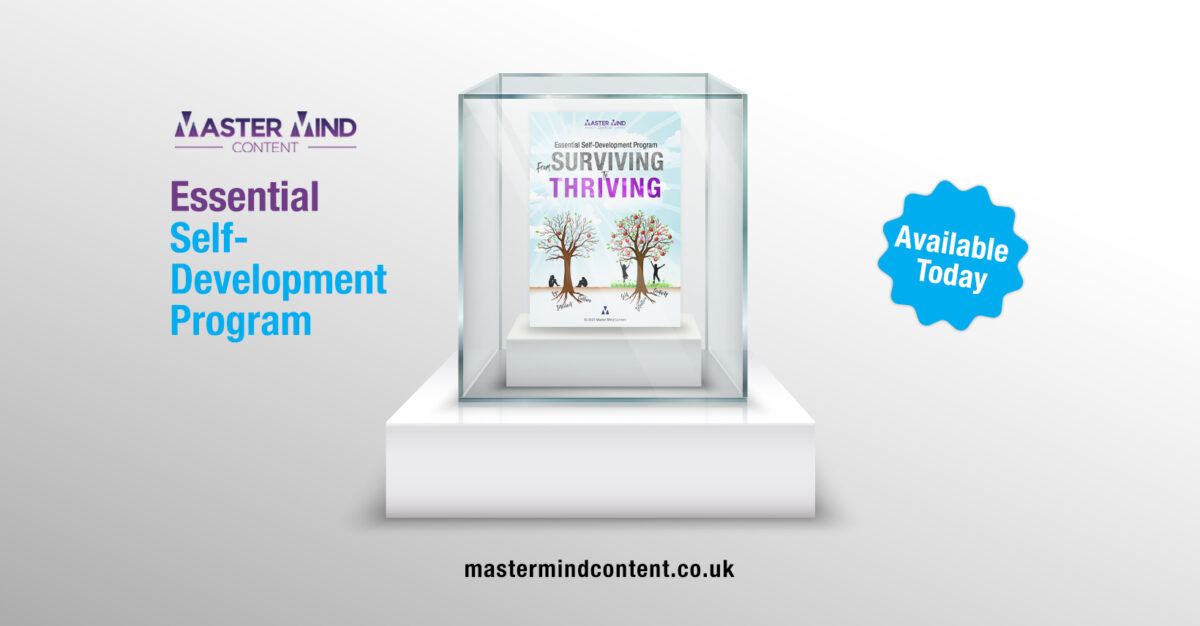
The purpose of this content is to investigate the causes of misdirected passion and provide some potential solutions that can help you channel your passion in constructive ways.
Passion is a key source of life. It is the force behind enthusiasm, determination, desire and ambition. When channelled in the right direction and produces positive results, this energy can give you a positive sense of satisfaction and fulfilment.
Because passion serves as a source of intrinsic motivation, you are driven with a sense of purpose. Your capacity to plough your energy into intentional goals is unerring even when you are confronted with obstacles and challenges.
Thus passion is a prerequisite for personal growth and your overall general well-being.

When passion is misdirected, your focus of intention may lead to outcomes that are not conducive to relationships, overall well-being, growth, or fulfilment. It can also be destructive.
Recognising when passion is being channelled into areas that are counterproductive or harmful is crucial for personal development and making positive life choices. Redirecting passion toward pursuits that align with long-term goals, values, and positive outcomes can contribute to a more fulfilling and balanced life.
It’s also important to recognise when your passion is not being channelled in constructive ways and establish the reasons why.
Misdirected passion refers to a situation where a person’s intense enthusiasm, energy, or strong emotions are channelled into activities, pursuits, or endeavours that may not align with their long-term goals, values, or well-being.
In other words, the passion is directed toward something that may be counterproductive or detrimental in the larger context of the individual’s life.
Someone might invest intense passion and energy into a toxic or unhealthy relationship, where the emotional intensity is not conducive to the well-being of either party.

An antagonistic narcissist, for example, manipulates people so they are in control and always get what they want. They enter into win-lose negotiations, lack empathy and have a blatant disregard for the needs of others,
You also have problems committing to a long-term relationship. This is usually because you think about sex first. Personality is a secondary consideration, and once the initial excitement of a new conquest wears off, you become bored and ditch your lover whilst turning your attention to the next source of your desire. [Wounded Lover | Wound Philanthropist]
Passion has a binding quality that is the underlying force of attachments. The things we are usually passionate about excite and thrill us. It can also have constructive uses such as creative pursuits or sports that help you to channel your energy into healthy activities that support your overall well-being.
When the wounded Philanthropist is undeveloped or the wounded Lover has no self-discipline, your passions can be destructive. Addictions such as substance abuse, excessive risk-taking, or other harmful activities which have negative consequences on your health or responsibilities.
Individuals who become passionately obsessed with a particular goal, idea, or achievement can neglect other areas of their life. Subsequently, your relationships can suffer and your overall state of well-being can be knocked out of balance. [Wounded Philanthropist]

If the Lover energy is a dominant archetype for you, obsessive pursuits typically take the form of compulsive or addictive behaviours that provide some form of risk, such as adrenaline fuelling extreme sports, gambling, shopping, or sex in public places. [Lover]
Devoting intense passion to a career that does not align with one’s values or long-term goals can eventually lead to dissatisfaction and emptiness. When you have to “work” for a living, it eventually becomes hard work, even if you are still ambitious enough to succeed.
The wounded Philanthropist can feel as though they have not reached their full potential and become dissatisfied with their status in life. But this initial problem is because you misdirected your passion in the early days of your career or entered a profession you thought would build your self-esteem and help you climb the social ladder.
The Philanthropist is ready to fight for a worthy cause they are passionate about. But when this energy is underdeveloped, you could be fooled into believing a seemingly ethical cause is having negative consequences on society.
When your passion is misguided, you may be inclined to turn a blind eye to the negative issues. The real issue here is that you are too ashamed or arrogant to admit that you were wrong. The dust gets swept under the proverbial rug because your overwhelming sense of self-pride and self-importance is over-inflated.
Channelling misdirected passion into constructive and positive avenues requires you to let go of feelings of inferiority.
Misdirected passion can result in a lack of guidance or mentorship in your formative years. Both the Lover and the Philanthropist had a disconnect with their nurturing figures and were not exposed to things in life that stoked their passion.
Subsequently, as you mature and explore the world on your own, you come into contact with things that spark your passion. But because this energy has been stagnant for so long, it can erupt like a volcano. Here, there is a greater risk of forming unhealthy attachments.
In addition, the lack of proper direction or role models in early childhood makes you feel incompetent. You have a low self-image and tend to relate to pursuits that are not conducive to your long-term well-being.

The developmental goals of the Lover are to pursue passions and create healthy bonds with people and attachments to nourish your emotional well-being. Similarly, the role of the Philanthropist is to reject egotism and serve your real needs.
However, when this energy is in an infantile state of conscious awareness, your passions prompt you to be egotistical, obsessive, excessive and hedonistic. Your developmental goals are reflected in their opposite form.
If underdeveloped forces of the Philanthropist are trying to break through, you will also abuse positions of power and exploit others for your own gain. This is because your desires and attachments are considered a reliable source of comfort which you cannot find within.
As with all the other archetypes and emotional healing goals, transforming misdirected passion into constructive ways of being has to start with self-awareness.
Where are you misdirecting your passion? Do any of the behavioural qualities mentioned above ring true for you?
The next step is self-reflection. Take time to reflect on thoughts, emotions and actions that are causing a conflict. Are they being fuelled in destructive ways by passion? Identify if there are any areas where your intense emotions or energy might be leading to negative outcomes. Consider the impact your actions have on others.

Ensure that your passions align with your core values. If there is a misalignment, consider adjusting your pursuits to better reflect what truly matters to you without other people losing out.
An ethical approach that contributes positively to the people in your immediate environment or the wider community should be a top-of-brain priority.
Forging healthy attachments with the external world — people, objects and activities — should prioritise well-being. If misdirected passion is negatively impacting your relationships, job, family commitments, mental, emotional, or physical health, consider reevaluating your priorities and making adjustments.
Diversifying your interests could also be an option. This will encourage you to learn new skills and develop competencies which serve as a boost for your inferiority complex. It also helps to avoid a single passion becoming all-consuming which can fuel obsessions. Consider pursuing passions you can do with your family and closest friends.
When you’re open to adapting your passions and interests as your life evolves, you learn how to be more flexible and navigate challenges more effectively. You also start creating environments which enable you to thrive.
People pursue happiness in many different ways. But the myriad of ways to make you happy can be easily defined in two categories; hedonic and eudaimonic happiness.
Hedonic and eudaimonic happiness are two philosophical concepts that explore different dimensions of well-being and life satisfaction. They represent distinct approaches to understanding what constitutes a fulfilling and meaningful life.
Hedonic happiness is associated with the pursuit of immediate pleasure, joy, and the avoidance of pain. Eudaimonic happiness relates to the pursuit of purpose and meaning.
While hedonic and eudaimonic happiness are often discussed as distinct concepts, they are not necessarily mutually exclusive. There is a strong argument to take an integrated approach. A life well-lived is endowed with both pleasure and purpose.
However, sometimes the latter falls under the radar whilst a hedonistic lifestyle takes precedence. Some individuals can only escape their pain with objects and activities that bring them pleasure.
The pursuit of a purpose in life, on the other hand, can bring about long-term pleasure. That’s not to say you won’t enjoy the small pleasures in life anymore, you just won’t abuse them. Pleasure is an instinctual drive. Purpose is an intentional drive.
Thought-Provoking Quote
“Man’s search for meaning is the primary motivation in his life and not a “secondary rationalization” of instinctual drives. This meaning is unique and specific in that it must and can be fulfilled by him alone; only then does it achieve a significance which will satisfy his own will to meaning.”
~ Viktor Frankl, Man’s Search For Meaning [1]
The yardstick to measure the extent of your happiness is how you react and how quickly you recover from disappointment when pleasure is denied.
Let’s take a deeper look.
Hedonic happiness is a subjective experience of positive emotions and the immediate satisfaction of desires. The concept of hedonism, for example, emphasises the pursuit of pleasure and the attainment of enjoyable experiences as the primary goals of life.

Typical hedonic experiences are partying, eating delicious food, sexual intercourse or winning an award. The principal goal is to seek pleasure and gratification through activities that bring about positive emotions such as joy, excitement, satisfaction, and contentment.
The focus of pleasure-seeking behaviour is to maximise positive emotional experiences and minimise negative emotions. And whilst hedonic happiness can be derived from a variety of experiences, the feeling does not last. Once hedonic happiness wears off, you return to your usual emotional state.
Whilst hedonic happiness helps to nurture your sense of well-being, it has to be understood that it only changes your state at the moment. If your typical state leans more towards the unhappy end of the scale, you’re more inclined to indulge in hedonistic experiences more often — and even rely on them to keep you happy.
But what will you do when the things that once made you happy no longer quench your desire?
Thought-Provoking Quote
“Woe to him who saw no more sense in his life, no aim, no purpose, and therefore no point in carrying on.”
~ Viktor Frankl, Man’s Search For Meaning [2]
Studies show that individuals who have no sense of purpose have a higher tendency towards depression and suicide. The researchers concluded a sense of purpose in life has a significant outcome in your well-being, self-efficacy and overall quality of life. [3]
The concept of Eudaimonia can be traced back to ancient Greece. It is a central idea in the ethical philosophy of Aristotle, who extensively explored it in his work “Nicomachean Ethics” in reference to a state of human flourishing, well-being, and fulfilment.

The term Eudaimonia is often translated as “happiness” or “blessedness,” but it encompasses a deeper and more enduring sense of living a virtuous and meaningful life.
Aristotle argued that eudaimonia is achieved through the cultivation and exercise of virtues such as courage, wisdom, justice, and compassion. But virtues must also encompass the realisation and expression of your full human potential.
Thought-Provoking Quote
“Excellence is never an accident. It is always the result of high intention, sincere effort, and intelligent execution; it represents the wise choice of many alternatives – choice, not chance, determines your destiny.”
~ Aristotle, Nicomachean Ethics [4]
This includes intellectual, moral, and social aspects of development. It is not merely about experiencing pleasure but about fulfilling one’s unique capacities at every stage of your life’s journey. You may not be where you want to be yet, but if you take the steps to get there, you will arrive at your destination.
Eudaimonia, therefore, is closely tied to engaging in rational activities that are achievable but push you to learn new skills, character traits and wisdom. Pursuing a life purpose gives you the capacity to reason and broadens your understanding of the world, yourself and others.

Your capacity to understand human nature enables you to make ethical decisions whereby you pursue meaningful goals which contribute to the well-being of the community. This sense of purpose adds depth and significance to life.
Aristotle emphasised the social dimension of eudaimonia. Happiness is not a solitary pursuit but involves positive relationships with others that nurture your self-esteem, confidence and overall well-being.
There is nothing intrinsically wrong with seeking pleasure and freedom from emotional pain. Far from it. Hedonic happiness only becomes a problem when instant gratification becomes a habit and a habit becomes an addiction. [Wounded Lover]
Unlike momentary pleasures, eudaimonia is considered an enduring and lasting form of happiness and well-being. The sense of fulfilment that goes beyond transient experiences of pleasure and pain enables you to move away from the need for instant gratification.
Purpose and meaning in life is a personal pursuit which brings you into closer contact with yourself. In this connected emotional state, you don’t feel the need to pursue activities that give you excitement and joy or indulge in food and drink to relieve tension.
Eudaimonia brings hedonic happiness into equilibrium. It enables you to create healthy attachments to your external world because your passion and fulfilment are satisfied by engaging in activities that give your life purpose and meaning.
Hedonic adaptation allows you to engage in fleeting pleasures. This kind of enjoyment can improve mood during the day, even though you know your happiness is temporary.

It can also be the case that individuals with low self-esteem vehemently pursue their purpose and deny themselves pleasure. People who are devoted to religious practices of abstinence, for example, forgo immediate pleasure in the pursuit of the life purpose they have chosen.
You may also find this in people who are workaholics [Wounded Everyman] and martyrs [Wounded Caretaker]. If you see your sense of purpose is in the servitude of others, you might deny yourself the hedonic pleasures you need to nurture your well-being.
In both cases above, the motivation to give yourself over to a higher purpose may be to seek recognition and appreciation, or, in the case of spiritual pursuits, to put your life back on track.
However, abstaining from pleasures because you believe they are sinful could result in denying yourself the opportunity to enjoy life and find happiness. [Lover]
Finding a purpose that gives your life meaning can be a game-changer. But you shouldn’t lose sight of the fact that the small pleasures in life prove that you’re worth it.
Thought-Provoking Quote
“I view my life as being abundant with meaning and purpose. The attitude that I adopted on that fateful day has become my personal credo for life: I broke my neck, it didn’t break me. I am currently enrolled in my first psychology course in college. I believe that my handicap will only enhance my ability to help others. I know that without the suffering, the growth that I have achieved would have been impossible.”
~ Viktor Frankl, Man’s Search For Meaning [?]
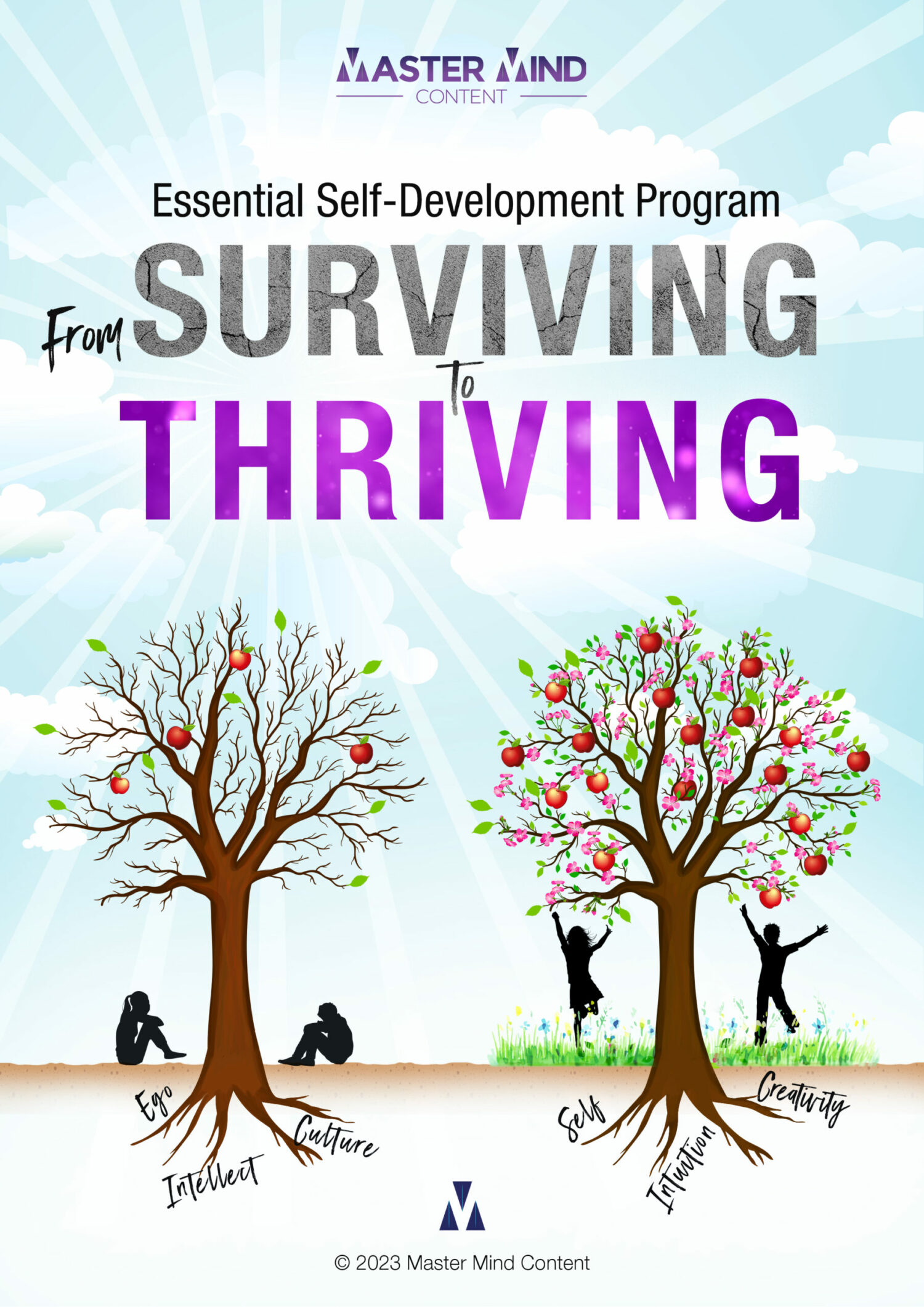
[1] Viktor Frankl, Man’s Search For Meaning, p.121 (1946)
[2] Viktor Frankl, Man’s Search For Meaning, p.98 (1946)
[4] Aristotle, Nicomachean Ethic
[5] Viktor Frankl, Man’s Search For Meaning, p.172 (1946)
“Ever since Charles Darwin published his natural selection explanation for the origins of the great variety of life on Earth in 1859 all manner of theories have been put forward to suggest how one species, namely our species, managed to defy the essential selfish nature of the natural selection process and develop unconditionally selfless moral instincts.”
~ Jeremy Griffith, Freedom: The End of the Human Condition, p.219 para 388 (2015)
The principle of love indoctrination plays a huge role in developing meaningful relationships. It could also be pivotal to improving society and stopping the rot of toxicity.
Love indoctrination holds the key to our happiness, general well-being and positive mental health outcomes.
In theory, the widespread practice of love indoctrination could also provide the answer to creating less toxic societies. At the moment, humanity is being torn apart by opposing views, polarising agendas, geo-political conflicts, toxic social media platforms, cancel culture and hate crimes.
We are in desperate need of a solution that brings people together. The most likely solution for future generations is the principle of love indoctrination. What we can do right now is to learn about these principles and start integrating them into our lives to push back against the tide of fear.
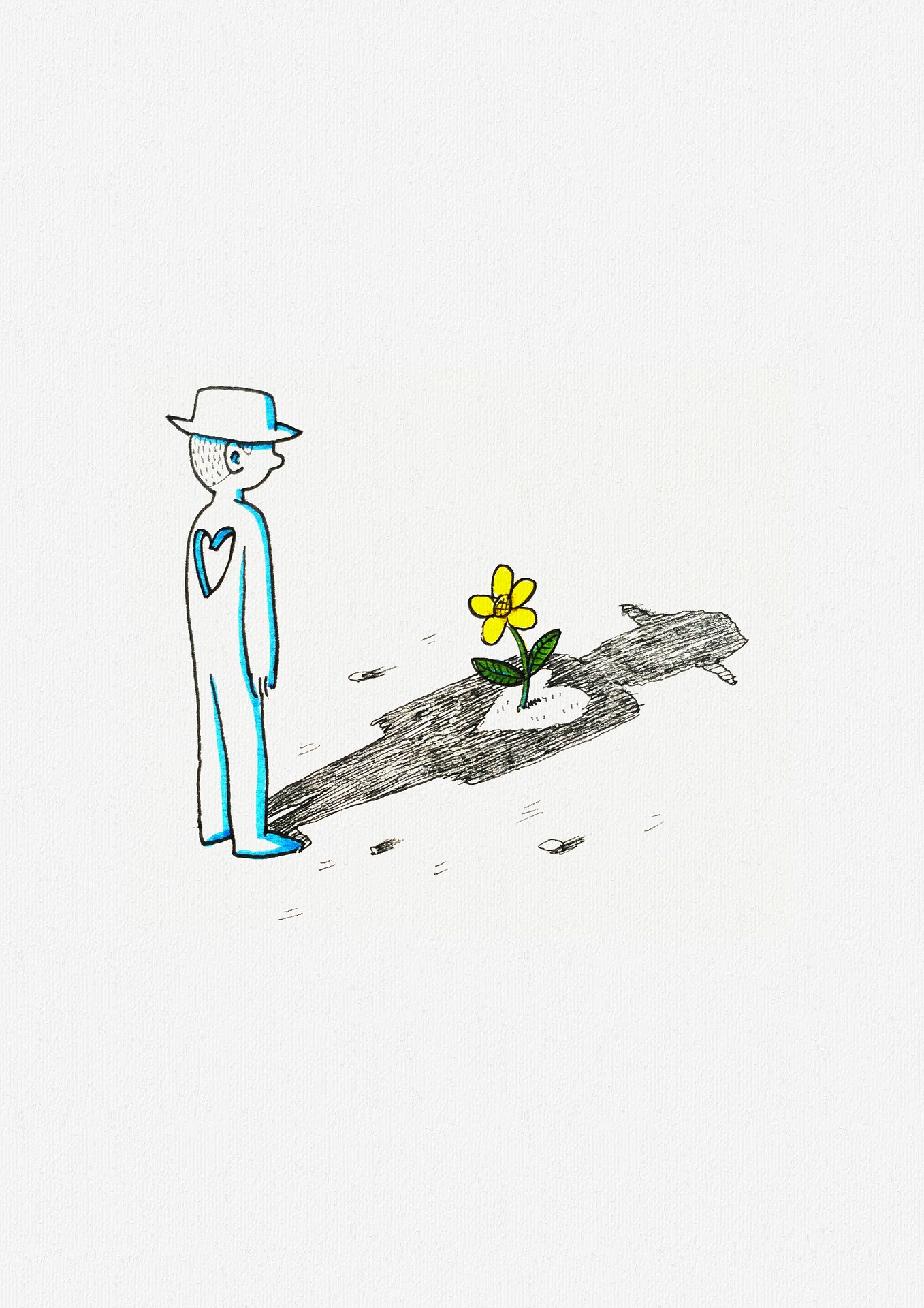
In this article, I will attempt to explain what love indoctrination is and how it should theoretically work. At the moment, “Love indoctrination” is not a recognised or widely used term in academic or psychological literature and studies are in their infancy.
The first time I came across the phrase was in the groundbreaking book, Freedom: The End of the Human Condition, written by Jeremy Griffith. The Australian biologist calls for us to raise our children from a love-based centre.
Thought-Provoking Quote
“To deny the importance of nurturing is to deny the importance of the main activity we need to practice if we are to produce humans who are sound and secure in self. Indeed, it is only through the nurturing of our offspring that the human race can help to become healthy, psychosis-and-neurosis-free humans once again.
~ Jeremy Griffith, Freedom: The End of the Human Condition p.324, par 564 (2015)
Griffith points out the human condition today is largely, competitive, aggressive, neurotic, upset, ignorant and deluded. Ironically, academia and the mainstream media refuted the claims and Griffith had to present a case in front of the Supreme Court to get his work recognised.
The reactions of his critics proved the point he was making.
The increasing rates of depression, low self-esteem, lack of confidence and suicide also reflect that humanity is spiralling into a poor state of mental health.
So, what is going wrong?

Griffiths believes part of the problem is due to the misinformation that has been thrust from the halls of academia into the public domain. A lack of understanding about the human psyche has severed us from aspects of our personality and unconscious content is running riot!
Griffiths also believes the lack of love indoctrination in our child-rearing has contributed to generations of emotionally repressed individuals who struggle to build and maintain a positive self-image.
Love is widely regarded as the principle that connects us to healthy attachments. Healthy attachments underpin amiable environments and constructive outcomes.
The opposite of love is fear.
Fear binds us to unhealthy attachments and destructive behaviours such as substance abuse, verbal abuse and in some cases physical abuse.
When you watch the news, do you feel love or fear?
Indoctrination is the process of enrolling an individual into an ideology. Although “indoctrination” can be used for nefarious means in relation to political, social, economic and religious doctrines, in the hands of well-intentioned people, indoctrination can be an effective way to install effective strategies that nurture positive attitudes and sound mental health.
In the current paradigm, it’s clear to see that societies are being pulled apart. In truth, history shows us the world has always been this way. From the earliest writing to Julius Cesar’s famous ‘divide and conquer’ strategy, mankind has been competitive, aggressive and upset.
Griffiths points out that we came to be this way because our conscious mind challenged our instincts; the ego separated itself from the Self.
Thought-Provoking Quote
“The human condition emerged when our conscious mind challenged our instincts for the management of our lives, with the resulting psychologically upset competitive, aggressive and selfish condition being greatly exacerbated by the fact that our moral instincts are orientated to living in a way that is the complete opposite of the state, namely cooperatively, lovingly and selflessly.”
~ Jeremy Griffith, Freedom: The End of the Human Condition, p.93, par 151 (2015)
So why does the human race kill one another, harbour hate and antagonism, and engage in toxic debates? Aren’t we meant to be civilised and cultured?
It turns out that trying to be civilised and cultured is the root of the problem.
Jeremy Griffith believes that being “cultured” is not working out so well for us humans. The battle between instincts and intellect throws us out of balance and into emotional turmoil.
The Austrian psychoanalyst Sigmund Freud noted the same problem over 100 years ago. The father of depth psychology blamed civilised culture for cutting off the animal instincts in man and resigning “unacceptable” parts of our personality to the unconscious.
Thought-Provoking Quote
“The price we pay for our advance in civilization is a loss of happiness through the heightening of the sense of guilt.”
~ Sigmund Freud, Civilization and Its Discontents (1930)
(in James Strachey (ed.), The Standard Edition of the Complete Psychological Works of Sigmund Freud (1978), vol. 21)
Subsequently, the ego disassociates with split-off aspects of our conscious nature — archetypes project themselves onto the ego to serve as a coping mechanism. If the ego associates with the coping mechanism, it becomes part of your personality and habitual nature.

When archetypal energies project from the unconscious and take possession of the ego, your thoughts, actions and emotions are driven by an energy you may not have any control over.
Archetypes in the unconscious cannot be controlled and ultimately enslave the ego.
Thought-Provoking Quote
“I wanted to express the fact that one or other basic instinct, or complex of ideas, will invariably concentrate upon itself the greatest sum of psychic energy and thus force the ego into its service. As a rule the ego is drawn into this focus of energy so powerfully that it identifies with it and thinks it desires and needs nothing further. In this way a craze develops, a monomania or possession, an acute one-sidedness which most seriously imperils the psychic equilibrium….“A man thinks that he wills and chooses, and does not notice that he is already possessed, that his interest has become the master, arrogating all power to itself.”
~ Carl Jung, CW7 Two Essays on Analytical Psychology, p.111 (1928)
The Swiss psychoanalyst suggested that it is the splitting off of consciousness that separates the ego from the Self. Jung also postulated that “disunity with oneself is the hallmark of civilized man.” CW7, p.16
Moreover, this separation lays the foundation for neurosis and dis-ease.
Thought-Provoking Quote
“Neurosis is self-division. In most people the cause of the division is that the conscious mind wants to hang on to its moral ideal, while the unconscious strives after its—in the contemporary sense—unmoral ideal which the conscious mind tries to deny.”
~ Carl Jung, CW7 Two Essays on Analytical Psychology, p.18 (1928)
Throughout the centuries, philosophical reasoning determined that man is the most unhappy, restless and debilitated when there is a split in the Self-ego axis. When the ego separates from the Self, we become ego-driven and destined to go off the rails.
An inflated ego is the most basic stage of human development. It is guided by complexes and neuroses (archetypal energies) that prompt habitual behaviour. Some of these behaviours will be destructive. In this state of consciousness, individuals believe…
Thought-Provoking Quote
“… only I and my extensions (my family, my culture, my country, and so forth) have the primary validity. All others are contingent.”
~ Amit Goswami, The Self-Aware Universe. p.209 (1995)
Which brings us back to the civilisation of nations.
In trying to be civilised, we are making ourselves ill. By splitting off aspects of our True Nature, we lose connection with our innate qualities. Not only do we lack self-awareness of our destructive nature, but we ignore parts of our personality that would enrich our lives.
The more we repress parts of our nature, the more complexes we develop. The more complexes we develop, the more distorted our thinking becomes. And the more legacy media and politics play on our tribalism for “my family, my culture and my country,” the wounds of humanity will continue to be spliced open.

We then get into the realm of “Groupthink” a psychological phenomenon in which a group of people are influenced into conforming with a certain agenda.
Let’s take capitalism.
Capitalist culture is built on the promise of success and wealth. Sure that exists for a lot of people, but it’s built on a fragile foundation of competitiveness and competition which breeds aggression, corruption, dishonesty and unethical behaviour.
We also have to face the consequences for the billions that do not achieve wealth and success; low self-esteem, chronic anxiety, depression, and violence. The list of conditions goes on and it’s not a pretty list.
Notice how all the behaviours and conditions I mentioned are grounded in fear.
Fear is the opposing emotional state to love.
Thought-Provoking Quote
“Here is yet another important consideration for helping us to understand the individual in a group: Moreover, by the mere fact that he forms part of an organised group, a man descends several rungs in the ladder of civilisation. Isolated, he may be a cultivated individual; in a crowd, he is a barbarian— that is, a creature acting by instinct. He possesses the spontaneity, the violence, the ferocity, and also the enthusiasm and heroism of primitive beings. ‘ (p. 36.) He then dwells especially upon the lowering in intellectual ability which an individual experiences when he becomes merged in a group.”
~ Sigmund Freud, Group Psychology and the Analysis of the Ego (1921)
Jung agreed with Freud’s view adding that repressed consciousness “are transformed into something essentially baleful, destructive, and anarchical” and indirectly contributes to the moral degeneration of society.
Groupthink, this “collective psyche” that pulls people apart corrupts the morality of men because individuals have lost the capacity to think for themselves, rationalise and reason. They conform to fit in.
This happens when the Self-ego axis is severed. The ego becomes split off and individuals either have a poor self-image of themselves or they become so power-driven they only care for themselves.

Sadly, a so-called “civilised” culture remains in the infantile state of the collective psyche which opens individuals to manipulation.
Moreover, unless the ego is developed to a stage of maturity in which you can function successfully in the world, you will not achieve the success you desire.
This most basic state of conscious awareness makes people bitter, resentful, frustrated, angry, upset, violent, deluded and demented.
Thought-Provoking Quote
“Hence every man is, in a certain sense, unconsciously a worse man when he is in society than when acting alone; for he is carried by society and to that extent relieved of his individual responsibility.”
~ Carl Jung, CW7 Two Essays on Analytical Psychology, p.240 (1928)
In short, we should nurture our True Nature.
As mentioned above, love and fear are opposing forces. Fear manures the breeding ground of aggression, anger, frustration, restlessness, conformity, chronic anxiety, upset, denial, polarisation etc.
Love, on the other hand, promotes compassion, empathy, connectedness, support, gratitude, forgiveness, acceptance, happiness, fulfilment, harmony etc.
It is critical for the human race to operate from a love-based centre.
The only way to do that is to repair the fragmented personality that has been torn apart and buried in the unconscious. When you integrate more of the healthy archetypal qualities that are innate in human beings, you move towards sound mental and physical health and away from neuroticism and disease.
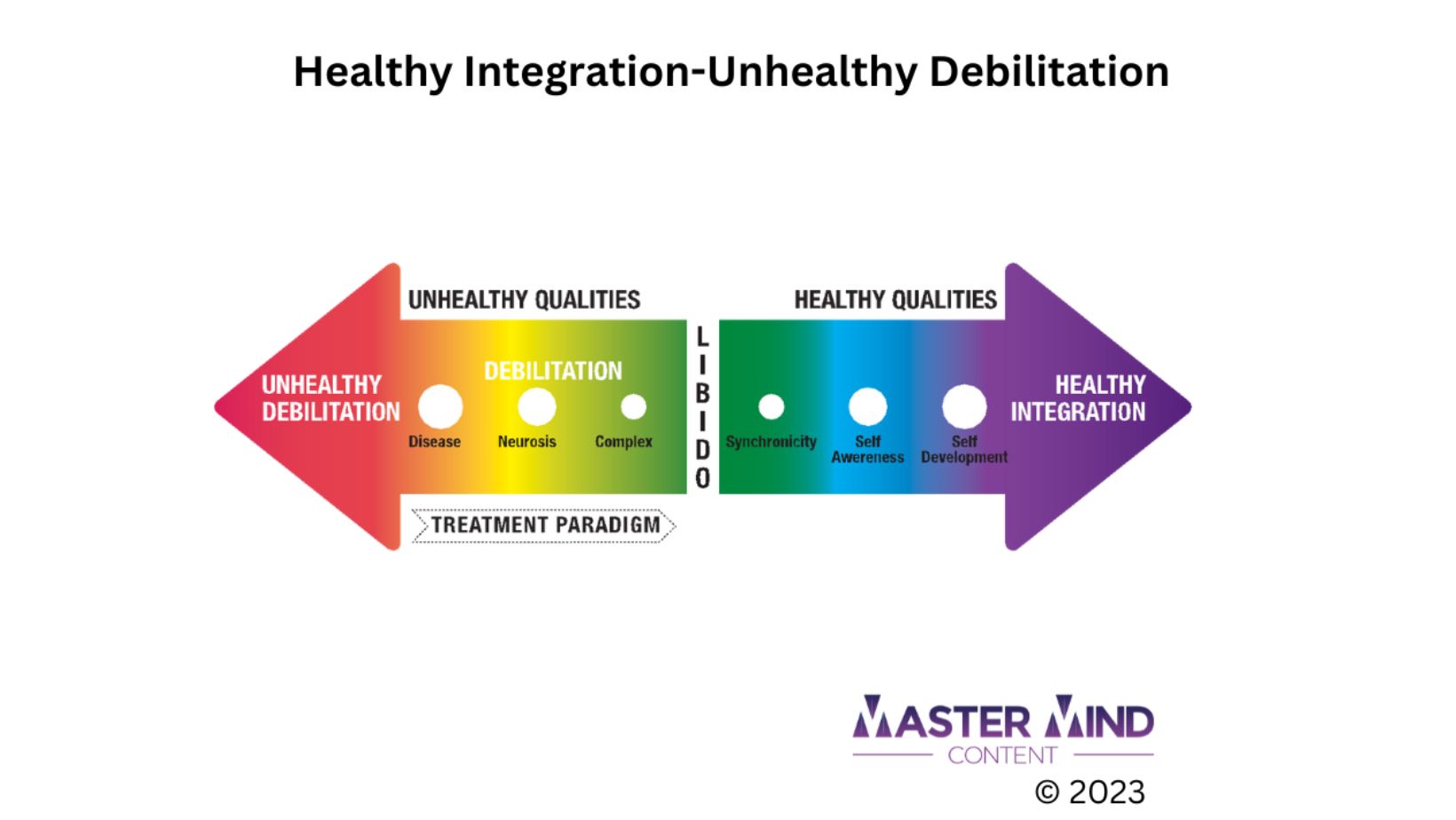
It is the archetypes appearing as complexes and neuroses that inform you which aspects of your personality are ready to be integrated. Unconscious content also emerges in symbolic imagery through dreams, and the synchronicity of symbols and events that reveal themselves to you to offer meaning.
With the Master Mind Content archetypes tool, underdeveloped archetypes are easy to identify. Understanding the archetypes will also help enhance your insight into other people and subsequently improve your relationships.
Once you are accustomed to the archetypes, use your knowledge to develop and deflate your personal ego but also to advise friends and family on how to overcome issues they encounter. If you have children, you can also use the archetypes tool to help guide them safely to psychological maturity.
If you don’t receive love as a child, or you perceive that you were not given the love and affection a child needs, the critical components to practice love indoctrination will not be programmed in your subconscious.

To program love into your subconscious, you may need to start with the Everyman archetype and learn to accept yourself first. Self-acceptance is the first step to self-love. Self-acceptance also includes accepting others for their views, race, preferences etc that are different from yours.
The second stage is to nurture self-love by practising self-compassion and self-respect. This also includes being compassionate and respectful to others. Start practising today by taking a look at these 12 Self-Love and Self-Compassion Strategies.
Given both the wounded Everyman and the wounded Caretaker have low self-esteem, thus nurturing is required. Building self-esteem is another stepping stone to self-love.
Learning new skills and competencies can help to build self-esteem. As Abraham Maslow points out in his pyramid of human needs, humans need to feel as though they belong to feel loved.
Joining a group of like-minded people to engage in crafts, sports or study is a fun and effective way of nurturing self-esteem and connecting with people.
Research in epigenetics also shows how repetitive actions become genetically programmed. We behave according to how we are genetically coded. Initially, we behave like our parents and ancestors but later in life become coded by the the environment, teachers, peers and the experiences we have in life.
Individuals with a fragmented personality are coded for survival.
Thought-Provoking Quote
“Genetic traits for nurturing are intrinsically selfish (which, as has been emphasised, genetic traits normally have to be if they are to survive) because through a mother’s nurturing and fostering of offspring who carry her genes her genetic traits for nurturing are selfishly ensuring their reproduction into the next generation. However, while nurturing is a genetically selfish trait, from an observer’s point of view it appears to be unconditionally selfless behaviour—the mother is giving her offspring food, warmth, shelter, support and protection for apparently nothing in return. Children come into the world instinctively expecting to receive unconditional love and when they don’t get it – receiving conditional love instead – they are so innocent, so trusting in a true, all-loving, upset-free world that the only conclusion they can come to for not being unconditionally loved is that for some reason they don’t deserve it and are therefore a worthless, unlovable, bad person.”
~ Jeremy Griffith, Freedom p.220, para 389 (2015)
Griffith goes on to note that from the infant’s perspective, it is receiving unconditional love. The perception of a child who is exposed to love indoctrination practices only experiences acts of selflessness from its parents and family members.
The infant’s central nervous system is programmed with unconditional selflessness.
Thought-Provoking Quote
“The love-indoctrination process states that…an infant brain is able to be inscribed or indoctrinated with unconditionally selfless love, thus allowing it to grow up to behave selflessly.
~ Jeremy Griffith, Freedom p.319, para 551, (2015)
Epigenetics shows us that genes significantly influence how we experience life. Whilst some genes are passed down from our ancestors, our cells are also altered by the environment — the information we absorb through the five senses.
The “in-formation” we process determines our personality, our choices and ultimately, how we experience life.
Thought-Provoking Quote
“Decades of research on twins, adoptees, and families have led to the inescapable conclusion that most reliably measured psychological characteristics are influenced to some degree by genes. Behavior also shows signs of genetic influence; the way one experiences stressful life events, for example, shows some genetic influence. Even personal aspects of individuals, such as spirituality and political ideology, are affected to an extent by genes.1 It should come as no surprise, then, that genes influence the ways in which families function and how family members relate to one another.2 Familial relationships of all kinds—parent-child, sibling, and spousal—can be shown to be at least partially the product of genetic factors.”
Thus the Caretaker is your lead archetype for nurturing the information you process. The Caretaker, which I identify with the goddess Demeter in the Master Mind Content archetypes tool, is the goddess of agriculture and is responsible for planting healthy seeds that nourish life.
To reap the rewards of your labour, the fruits of your desire need planting, nurturing and digesting. Here you see the agricultural theme of cultivating subconscious programs that develop into healthy attitudes, constructive behaviours and a wholesome way of being.
In contrast, the wounded Caretaker appears kind and considerate on the surface but lacks self-esteem. The motivation for being a people-pleaser is a search for validation in the form of attention, recognition and appreciation.
Because there is a condition attached to your motive, being a people-pleaser is considered a selfish act, not a selfless act. Selflessness is unconditional.
The capacity for selflessness is a quality of the Philanthropist which the Caretaker becomes when fully matured and integrated with the qualities of the Lover. The Philanthropist is one of the three highest states of human development.
Unconditional love and unconditional selflessness.
Thought-Provoking Quote
“So ‘love’ is corporative selflessness-it’s not just selfishness but unconditional selfishness, capacity, if called upon, to make a full, self-sacrifice and commitment to the maintenance of the larger whole.”
Jeremy Griffith, Freedom p.187, para 321, (2015)

When you lack self-esteem, it can ruin your life in a variety of ways. What’s more, there are a number of reasons why you lack self-esteem, all of which require a different solution.
Once you realise why you lack self-esteem, you are a step closer to healing emotional wounds and upgrading subconscious programs.
Nurturing self-esteem is crucial for overall mental and emotional well-being. It plays a significant role in shaping various aspects of a person’s life, impacting relationships, achievements, and positive mental health.
Individuals with healthy self-esteem often exhibit better emotional regulation. They are more capable of managing and expressing their emotions in a constructive manner.
Higher degrees of emotional intelligence empower you to form and maintain healthy relationships in all aspects of life. Individuals with a positive self-image are more likely to engage in supportive and mutually beneficial relationships.
Subsequently, nurturing self-esteem contributes to increased happiness and life satisfaction. Individuals who appreciate and value themselves are more likely to lead fulfilling lives.

On the flip side, when you lack self-esteem, you generally feel increased stress levels that you will lose the relationships you do have or worry that you’re not achieving the standards your boss expects of you in your job.
Other typical symptoms that indicate you have low self-esteem include questioning whether you fit in, worrying about whether a person likes you, having paranoid thoughts about what people think of you and fretting over new challenges.
Self-esteem is your sense of self-worth and plays a central role in how you experience life. How much you value yourself has a direct correlation with your capacity to pursue goals and the quality of your relationships.
For example, self-worth can determine how your friends and lovers treat you and how you interact with them. But also how you treat them. [1] Thus the value you place on yourself determines how you nurture relationships and create meaningful bonds.
A negative relationship with yourself can damage your family and intimate relationships, your career prospects, and your overall satisfaction with your life. [2] People who have a low sense of self-worth tend to have a hard time forging close and meaningful relationships.
The definition of self-esteem given in psychology is “the ability to form an identity and then attach a value to it.” [3] So if you have low self-worth and attach a high value to a friendship or relationship, it’s more likely to increase your desire to hold on to it.
You can apply the same reasoning to all aspects of your life. The self-development guru Jim Rohn said one of the most important lessons he learnt was to ask how much is something worth rather than how much it costs.
The answer is, how much is something worth to you? What value does it offer to the quality of your life?
How you attach value to yourself is largely determined by your perceived characteristics and competencies. People who lack self-esteem typically deny themselves opportunities to pursue goals they are worthy of on the basis that they do not feel as though they are good enough.

Therefore, how you evaluate yourself plays a central role in how you experience life. The problem some people have is that how you perceive yourself does not always reflect how you actually are or the value you bring to a relationship or job role. [4]
This can cause all sorts of problems for individuals with low self-esteem. The types of problems you can expect to encounter can be identified by which archetype self-esteem surfaces.
Self-esteem surfaces in four archetypes. You can identify the archetype by the nature in which low self-esteem appears for you.
If you possess the unhealthy qualities of the wounded Caretaker, your lack of self-worth originated because you did not form strong emotional bonds with your father. To get the love, attention and recognition you craved from your father, you adopted maternal values and became all-nurturing, all-giving and all-loving.
A father’s role in the family unit is to teach the child discipline, values and how to effectively engage and interact with the world. This is necessary for developing competencies and laying the foundations to build a stable inner structure.
When the relationship between father and child is not there, the child develops a subconscious program that you are not worthy of love and attention. Your presence and your achievements are not recognised.
The consequence of this is a lack of emotional security and the belief that you have to do things for other people to be recognised. You de-value the value you bring to a relationship and may even lose all sense of dignity by engaging in degrading acts just so other people will respect you.
A lack of self-respect is self-neglect.

It’s not unusual for a wounded Caretaker personality with low self-esteem to be manipulated by others. People will take advantage of your good nature.
Typical symptoms are:
People who are dominated by the wounded Hero tend to lack self-esteem due to a string of perceived failures. This can happen if you have an inner critic that prompts you to focus on the things you can’t do rather than all the things you are good at.
Thought-Provoking Quote
“A legal secretary found that her critic often used the word “screw- up. When she thought about it, she realized that “screw- up” stood for a list of negative qualities. It meant someone who was incompetent, unliked, a taker of foolish risks, a person (like her father) who would run away from problems. When the critic said “screw- up,” she firmly believed that she was all of these things.”
~ Matthew McKay & Patrick Fanning, Self-Esteem: A Proven Program of Cognitive Techniques for Assessing, Improving and Maintaining Your Self-Esteem [5]
The Hero’s perceived lack of competencies to engage with the world is largely due to being molly-coddled as a child. When children are not encouraged to learn to do things for themselves, they do not mature with a willingness to face challenges and learn new things.
As you mature and become confronted with challenges, particularly in adolescence, you experience more failures — but never learn how to overcome failure or use mistakes as a prompt to try tackling something with a different strategy. The bane of the Hero is you have no strategy.
It may be the case that you lack self-esteem, and competencies, due to sibling rivalry. Older children who feel left out because they are not getting the same level of attention as the newborn baby can feel unloved and unworthy.
This may also prompt the child to manufacture situations where they need the help of their parents, or they get their parents to do something for them rather than doing it for themselves. This display of ineptitude is a show to inform the parent that they need their parent’s attention.
Sibling rivalry can also have a knock-on effect on the relationship between the older and younger siblings. If the older sibling does not overcome the jealousy, bullying and other non-loving behaviours can occur throughout the childhood of the younger sibling.
Without a protective father figure around to rule the roost, the antagonism felt by the younger sibling would naturally damage your sense of self-esteem.
Low self-esteem in the wounded Hero can also surface in adults who were told they were good for nothing as a child. It could also be the case that you didn’t perform well at school but you are actually intelligent. The school system let you down because you were disengaged. The healthy Hero only surfaces when you engage in life in positive ways.
Individuals with an undeveloped Everyman have a deep insecurity that people will not like them because they are different. This can happen to people who recognise they are different from an early age but want to fit in with a certain group.
However, your strategy to fit in where you don’t belong does not play out too well. What happens is you follow the crowd and adopt the things they like rather than the things you like. You pretend to like the same music, the same TV shows, the same clothes, the same foods. You may like some things but don’t admit that you don’t like the things you don’t like.

By adopting everything everyone else likes, the Everyman does not allow you to become an independent thinker and develop your own identity. As you get older, your self-esteem is eroded even more because you don’t know what you like or who you are. You have become a ghost in a mask but can’t work out why people ignore you.
The Everyman is also status-driven. You believe that material or professional success will make up for the lack of self-esteem and subsequently overwork to impress your superiors. As a result, you risk burnout which can lead to ill health and depression.
Like the Everyman, the Creator’s lack of self-worth stems from a struggle to find acceptance among a group of like-minded individuals. Emotional and/or physical abandonment has programmed you with the belief that you’re not good enough and nobody wants you.
The key difference between the Everyman and the Creator is that the latter avoids situations. Whereas the Everyman tries to fit in by trying to be like everybody else, the Creator has come to accept you are different and has developed some semblance of independence.
However, keeping your distance does not enable you to form close and meaningful relationships. You can appear cold and callous and people start to avoid you like you are avoiding them. Here you see the mirror effect at play. We often experience what we are lacking in ourselves.
The underlying motivation for your avoidant tendencies is that you are harbouring shame and humiliation for being different. Your subconscious program informs you that you don’t fit in because you are different and nobody likes you.

This attitude makes you feel undeserving of love and acceptance. It’s easy to see why the Creator avoids relationships. You are afraid of being humiliated or you do not trust yourself to handle the responsibility of a relationship and will be rejected anyway.
Harbouring a sense that you are not deserving also leads to a fear of success which makes you prone to self-sabotaging relationships and career prospects. If you don’t try at something, you don’t fail — even when you have a yearning to succeed and probably fantasise about it.
Thought-Provoking Quote
“Everybody wants to succeed. It may seem paradoxical, but many people with low self- esteem feel a sense of shame deep down that leads them to avoid success at the same time they are seeking it. They want the good things of life but don’t feel that they deserve them. If they do achieve some success, they fear that it will just set them up for a bigger fall later. They will become prominent targets for other people’s envy. Or others will come to depend on them, and they’ll crumble under the responsibility.”
~ Matthew McKay & Patrick Fanning, Self-Esteem: A Proven Program of Cognitive Techniques for Assessing, Improving and Maintaining Your Self-Esteem [6]
Now you know the causes and the symptoms of low self-esteem, find out how to integrate self-worth with our Strategies for Overcoming Low Self-Esteem which is available in the VIP Members Area for patrons who have signed up for the Essential Self-Development Program.

[1] Self-Esteem Makes Successful Relationships; D Lancer (2016 Psych Central
[3] Matthew McKay & Patrick Fanning, Self-Esteem: A Proven Program of Cognitive Techniques for Assessing, Improving and Maintaining Your Self-Esteem, 4th Ed, p.1 (2016)
[4] Development of self-esteem across the lifespan, Orth & Robins, p.329, (2019
[5] Matthew McKay & Patrick Fanning, Self-Esteem: A Proven Program of Cognitive Techniques for Assessing, Improving and Maintaining Your Self-Esteem, p.19, (2016)
[6] Ibid, p.255
Archetypes hold the key to self-development, but what are they and why is it so important to recognise how archetypal energies show up in your life?
It’s well established that humans absorb information from the environment through our five senses. In the content titled ‘How The Nervous System Works,’ you discovered how the nervous system processes this information and stores it as memory. [1]
However, not all the information we have access to is encoded and stored as retrievable memory. A great deal of it is filtered out to prevent sensory overload. [2] What is rejected is said to be “split off”; fragmented, splintered, disassociated or dismembered. [3]
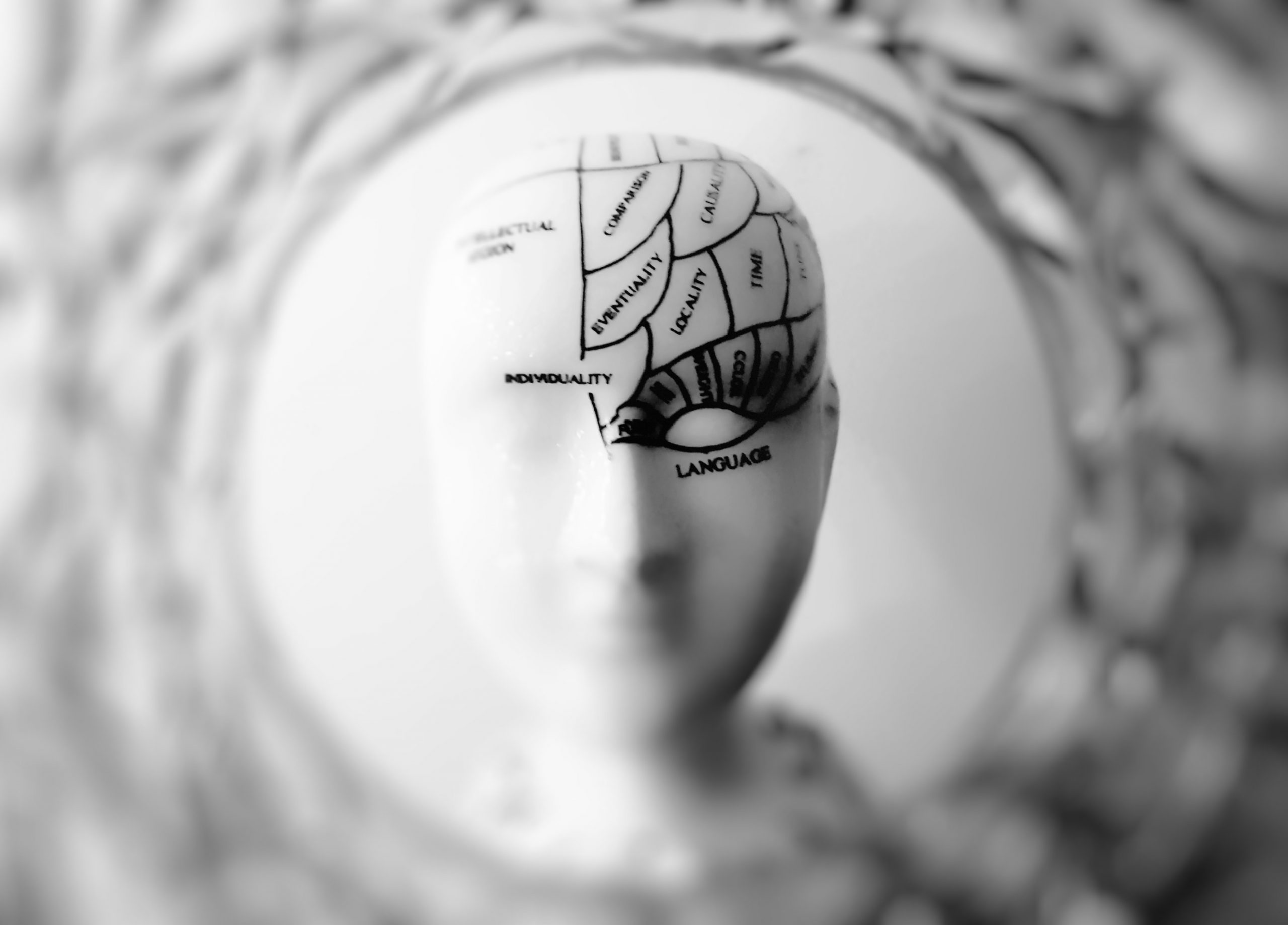
When consciousness is split off, it’s not fully accessible to the conscious mind. Sigmund Freud noted that when the ego dissociates, the content is repressed and resigned to the unconscious.
However, unconscious content still stored energy which resurfaces and ultimately influences our behaviours and decision making. The eminent psychoanalyst Carl Jung described these energies as archetypes.
If you’ve already read Jung’s Model of the Mind, you may remember the Swiss proposed the idea that archetypal energies can be recognised by symptomatic patterns associated with various complexes.
The Swiss also showed that a complex is an “autonomous personality” [4] that projects onto the conscious mind and takes possession of the ego. Autonomous personalities typically prompt peculiar behaviour which is a strong indication that it is part of the personality that has previously been split-off and repressed.
Thought-Provoking Quote
“One of the most important changes of internal structure is the phenomenon of possession: some content, an idea or a part of the personality, obtains mastery of the individual for one reason or another. The contents which thus take possession appear as peculiar convictions, idiosyncrasies, stubborn plans, and so forth. As a rule, they are not open to correction….Possession can be formulated as the identity of the ego-personality with a complex.” [5]
~ Carl Jung, CW9 Part 1, The Archetypes and the Collective Unconscious
Depth psychology demonstrates that dismembered parts of the personality become subconscious programs the ego associates with because it offers some form of comfort, reprieve, joy or pleasure.
However, although the ego may associate with the information it is passed, it doesn’t necessarily know the underlying motivation of archetypal energies because that information is unconscious (a subconscious program that is not accessible to the conscious mind).
It could even be a possibility that archetypal energies remain entirely unknown meaning it doesn’t exist in the conscious mind or as a subconscious program in the personal unconscious.
Thought-Provoking Quote
“A more or less superficial layer of the unconscious is undoubtedly personal. I call it the personal unconscious. But this personal unconscious rests upon a deeper layer, which does not derive from personal experience and is not a personal acquisition but is inborn. This deeper layer I call the collective unconscious. I have chosen the term “collective” because this part of the unconscious is not individual but universal; in contrast to the personal psyche, it has contents and modes of behaviour that are more or less the same everywhere and in all individuals. It is, in other words, identical in all men and thus constitutes a common psychic substrate of a suprapersonal nature which is present in every one of us.”
~ Carl Jung, CW9 Part 1, The Archetypes and the Collective Unconscious [6]
The ego is only concerned with your emotional survival and can only act on memory; that is, on what we already know. Thus we typically fall into the trap that is a bubble of comfort, transmute the same energies and yield the same results.
Remember, we create our experience of reality by our thoughts, emotions and actions. Thoughts, emotions and actions are all energy that carries vital in-formation. Information is consciousness.
Thought-Provoking Quote
“Most of us I think of information as data or what a person knows. But the reach of information is deeper than this. Physical and life scientists are discovering that information extends far beyond the mind of an individual person, or even all persons taken together. It is an inherent aspect of both physical and biological nature. The great physicist David Bohm called it “in-formation,” meaning a process that actually “forms” of the recipient.”
~ Ervin Laszlo, Science and the Akashic Field [7]
Jung proposed that archetypal energies project onto the conscious ego to fill a void left by the split-off consciousness. But archetypal projection that possesses the ego is an undeveloped aspect of consciousness.
The archetype has an ulterior motive the ego is not consciously aware of. One could say, the motive is to express themselves and release energy that is creating tension, or it may be that consciousness is trying to make itself known so the that ego and self can be reunited.

It is arguably both of these proposals. Unconscious content holds onto energy and needs to be released in one form or another. The Law of Thermodynamics determines that energy does not die, it transmutes.
So the energy has to go somewhere.
On the second point, we can learn about ourselves and integrate unconscious content into the conscious mind. When the alienated Self is reconciled with the inflated ego, you restore balance and harmony.
(If you don’t already know how the Self-ego axis becomes separated and causes inner conflict, you will learn how and why in the article: What is Ego Inflation and How Does It Happen?
What makes the second point such a vital necessity is because of the first point. Energy does not die it transmutes.
The burning question is, what does a particular energy become when it transforms?
Quantum physics shows that all energy carries information. The information we take from our environment enables us to function successfully in our environment.
However, when we don’t have the relevant information we make mistakes or completely malfunction. If we have partial information, we can pretty much muddle by and learn through experience.
The problem we all have is that consciousness is typically split off and repressed in childhood. Jung noted that “the bulk of what comes out of the unconscious [subconscious programs] has an infantile character at first.” [8]
These infantile behaviours are archetypal energies that have been split off and thus, undeveloped. They are parts of your personality that hasn’t been given the opportunity to grow and mature.
How many times do you act out like a child?
That’s your archetypal energies at play.
Subconscious programs influence our behaviour the majority of the time because the nervous system is running a program. [9] A memory is organised in such a way that helps us to survive.
Archetypal energies begin life as coping mechanisms, but when they are ignored and remain in the unconscious, they become chaotic and destructive.
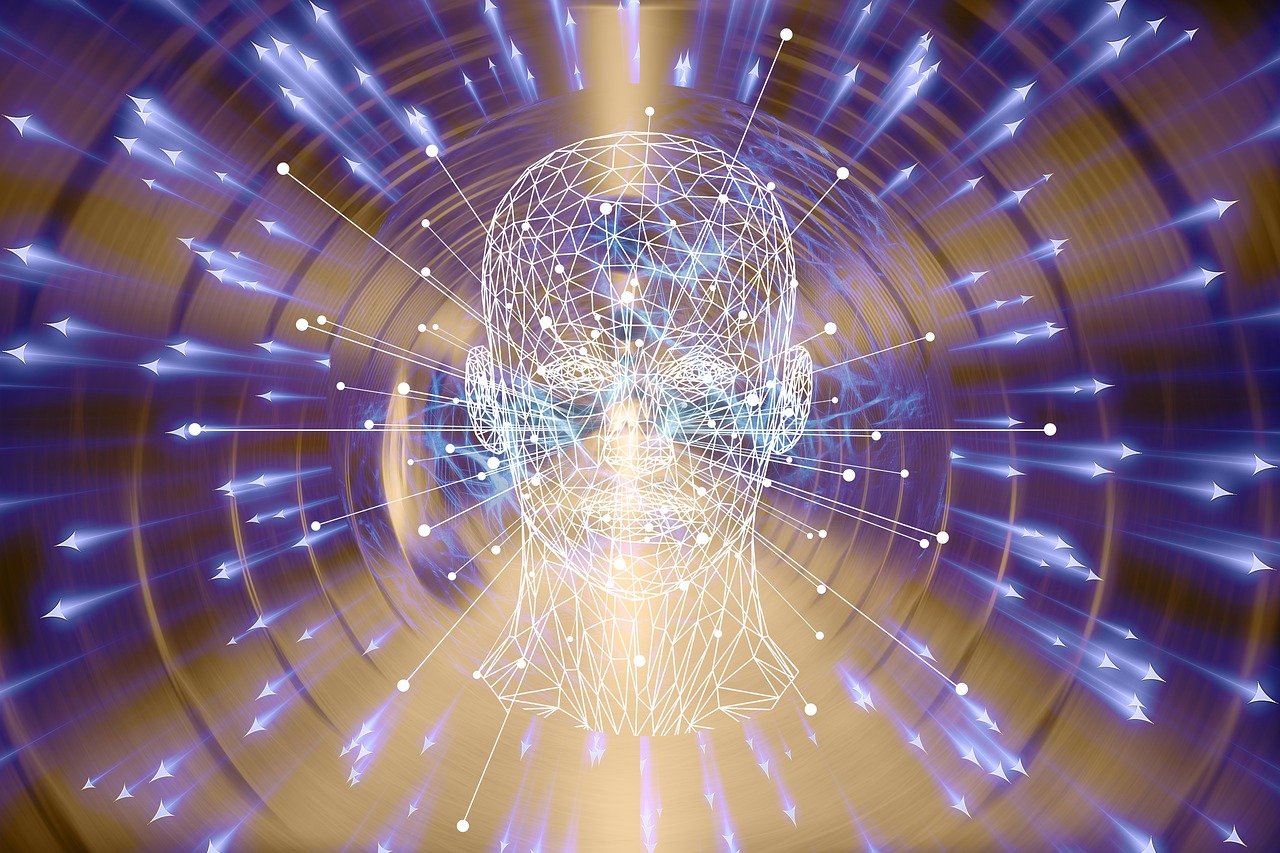
That being the case, it makes sense to upgrade your subconscious programs to perform the life you want to live. Hopefully, most of your subconscious programs are constructive and beneficial, but are you thriving or surviving?
Infantile behaviours are a reflection of repressed consciousness that is undeveloped. They are undeveloped because they have not been given expression since childhood. [10]
In other words, you haven’t given the repressed archetype the opportunity to develop. An important part of your nature is being ignored. Meanwhile, your ego is responding to a subconscious program that is only partially coded.
You could say that the mind is fragmented. It is not whole. And given whole shares the same root word as healthy, it makes sense to re-member dis-membered content that is buried in the unconscious and give it life.
This is only possible when you become self-aware of your complexes and integrate fragmented consciousness into conscious awareness — when you re-member dis-membered aspects of your personality.
A fragmented mind is a natural human condition. I don’t know if it’s ever possible to be completely whole, but I do know that the more fragments of your personality you integrate into the conscious mind the better equipped you are to handle life.
I know this because I struggled with chronic anxiety and depression for almost 30 years. My “whole” personality was fragmented into levels of complexes and neuroses that were heading towards debilitating disease. I was in the stage of neurosis.
The fragmented personality is not a modern problem. The latest biological evidence points towards the fragmented mind being an evolutionary process. It became necessary for mankind to develop intellect in order to manage the complexities of life.
Thought-Provoking Quote
“When the fully conscious mind emerged it wasn’t enough for it to be orientated by instincts, it had to find understanding to operate effectively and fulfil its great potential to manage life.”
~ Jeremy Griffith, Freedom: The End of the Human Condition [11]
And thus the battle between intellect and instinct developed. This is the inner conflict you experience taking place between the Self (instinct) and the ego (intellect).
When you act out, feel anxious, chaotic, angry, bored, restless or any of the other unhealthy traits listed in the wounded column of the archetypes tool, it is clear that the aspects of your personality are fragmented.
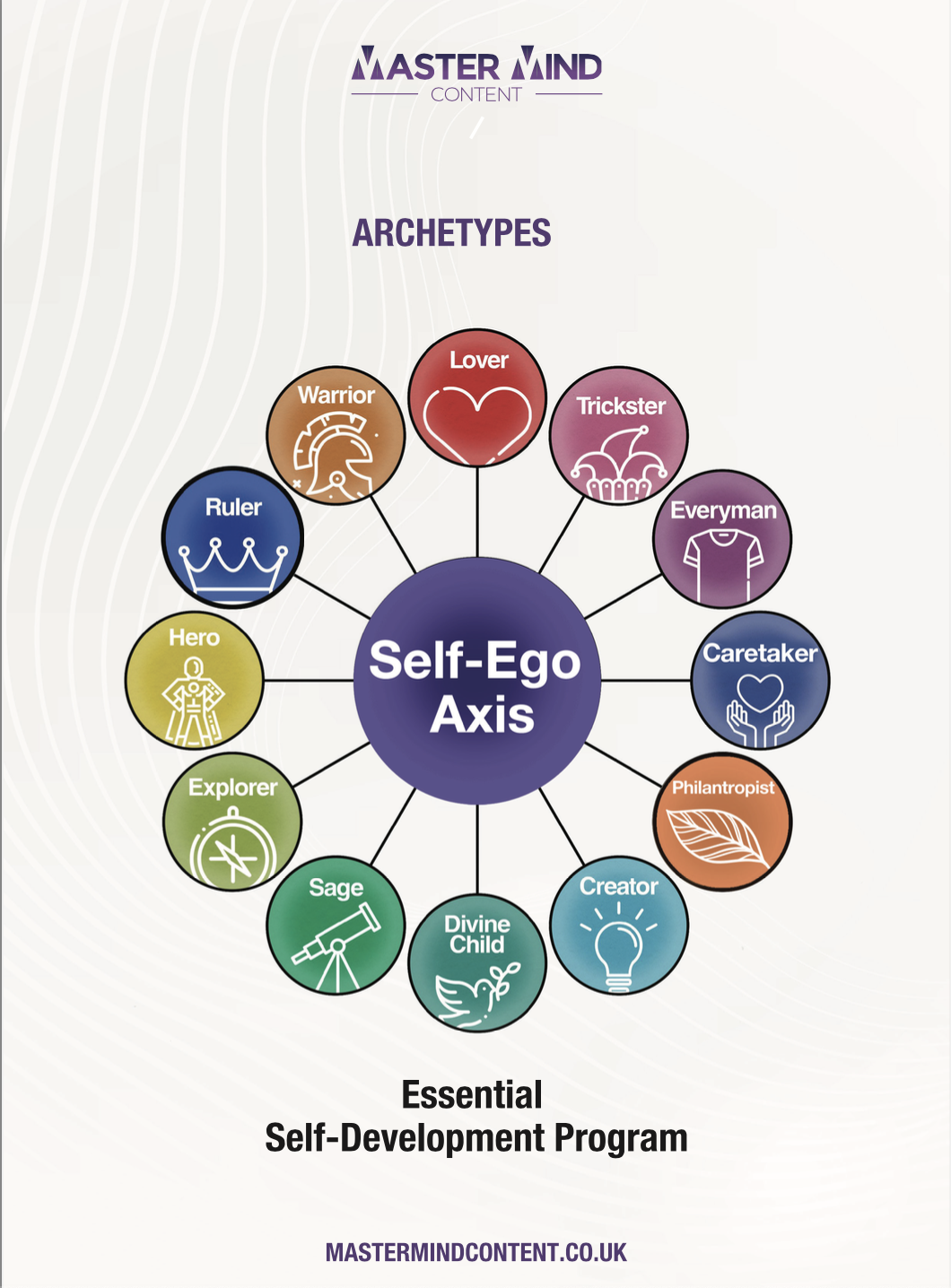
If you observe your patterns of thoughts, actions and emotions, you can identify which archetypes are calling for your attention. Archetypal energies surface as impulses that prompt moods and behaviours such anger, anxiety, lust etc.
If partial information is stored as a memory, you have a partially functioning program. When the program is totally undeveloped, you are more likely to make mistakes and risk “malfunction”.
Thought-Provoking Quote
“This perpetually recurring “pathologizing” is defined as “the psyche’s autonomous ability to create illness, morbidity, disorder, abnormality, and suffering in any aspect of its behaviour and to experience and imagine life through this deformed and afflicted perspective” (Hillman 1975a, p. 57). There is no cure of pathologizing, there is, instead, a re-evaluation.”
~ James Hillman, Archetypal Psychology [12]
Knowledge of how archetypal energies become split-off and cause mental illness and disease empowers you to reverse a trajectory towards debilitating illness before illness and disease kick in.
The path to debilitation and disease starts with a complex and moves on to neuroses when left unconscious. [13] The path in the opposite direction towards healthy integration starts with synchronicity and self-awareness.
When you observe repetitive experiences and determine how your thoughts, actions and emotions created that experience, you bring unconscious content into the light of conscious awareness — self-awareness!

An alternative option is to observe your complexes and neuroses. Depth psychologists in the first part of the 1900s held strong beliefs that repression is the creator of complexes and neuroses.
Thought Provoking Quote
“The neurotic symptom is the manifestation of a repressed instinctual impulse which has broken through the repression in a disguised form.”
~ Wilhelm Reich, The Function of the Orgasm [14]
For example, Wilhelm Reich pointed out that anxiety is born from a fear that you cannot act independently or freely. [15] When the ego does not have a program that enables you to interact with your environment, you naturally experience sense anxiety.
On the other hand, if you fail to front up to the challenges presented by your environment, the repressed aspect of your personality remains unconscious.
The challenges we face in our environment spark a chain of psycho and biochemical responses. And all this is energy. The human psychobiological system is electrical, chemical and hormonal — all of which are encased in neurotransmitters and processed by the nervous system.
Emotions influence the functioning of our major organs including the integrity of our immune system. When emotions are repressed, immune defences are inhibited and the body is less capable of fending off illness. [16]
Not only that, but it could be creating illness.
Thought-Provoking Quote
“The history of the development of a neurosis in an adult will also show that a suppressed emotion may frequently persist for a long time in unconscious or even in conscious phantasies, the content of which naturally runs directly counter to some predominant tendency, and yet that this antagonism does not result in any proceedings on the part of the ego against what it has repudiated. The phantasy is tolerated for quite a long time, until suddenly one day, usually as a result of an increase in the affective cathexis of the phantasy, a conflict breaks out between it and the ego with all the usual consequences.”
~ Sigmund Freud, Group Psychology and the Analysis of the Ego [17]
Although Freud does not clarify what he means by “all the usual consequences”, physicians throughout the ages came to understand that repressed emotions can impact a person’s health.
These practices are still continued in many places around the world including Chinese medicine, Ayurveda and shamanic healing. Western medicine is still coming to grips with it but ancient medicine is making a revival.
That’s probably because they work and patients relying on Western medicine have had enough of the limitations associated with medicines pushed by pharmaceutical companies. Health is a money-spinner but only if you have sick patients.
In his book, ‘When The Body Says No’, Gabor Mate points out the importance of holding up “a mirror to our stress-driven society so that we may recognise how, in myriad unconscious ways, we help generate the illnesses that plague us.” [18]
Thought-Provoking Quote
“Repression—dissociating emotions from awareness and relegating them to the unconscious realm—disorganizes and confuses our physiological defences so that in some people these defences go awry, becoming the destroyers of health rather than its protectors.”
~ Gabor Mate, When The Body Says No [19]
Dr. Mate specifically addresses the impact of stress on our health. But we invite stress when we are not prepared to face the challenges of our environment.
Isn’t it true that you don’t feel stressed when you know what you are doing? You may even feel confident, happy and accomplished whilst performing whatever task you are performing.
What’s more, these emotions are great for stimulating your emotional well-being.
On the flip side, the ego feels stressed and anxious when you don’t know what to do. And until you learn how to do it, that’s the program your nervous stores as a memory. Stress and anxiety.
Failing to express dismembered aspects of your personality could mean you are heading towards a debilitating disease. And that’s not the direction you want to be headed.

[1] How Memory Functions, openstax.com
[2] Science Update: NICHD researchers identify neurons that prevent sensory overload (2018)
[3] What Does It Mean to “Split Off” and Attack? Psychology Today, G. Henriques Ph.D (2020)
[4] Carl Jung, CW9 Part 1, The Archetypes and the Collective Unconscious, 2nd ed, para 484 (1968)
[5] Ibid, para 220
[6] Ibid, para 3
[7] Ervin Laszlo, Science and the Akashic Field, p.13, Kindle loc 359, (2007
[8] Carl Jung, CW7 The Effects of The Unconscious Upon Consciousness, p.46, para 21 (1928)
[10] Carl Jung, CW7 Two Essays on Analytical Psychology, para 21 (1928)
[11] Jeremy Griffith, Freedom: The End of the Human Condition, p.45 Kindle Loc1439, (2015)
[12] James Hillman, Archetypal Psychology, p.51 (1983)
[13] The Crucible of Complexes, Centre of Applied Jungian Studies (2023)
[14] Wilhelm Reich, The Function of the Orgasm (1927)
[15] Ibid
[17] Sigmund Freud, Group Psychology and the Analysis of the Ego, footnote p.18, (1921)
[18] Gabor Mate, When The Body Says No, p.7 of 335 (2011)
[19] Ibid, p.15 of 335 (2011)